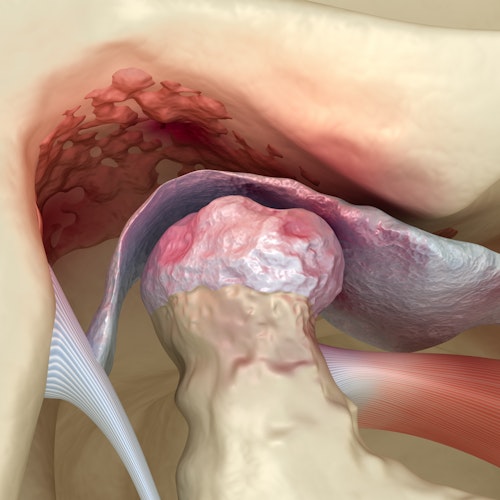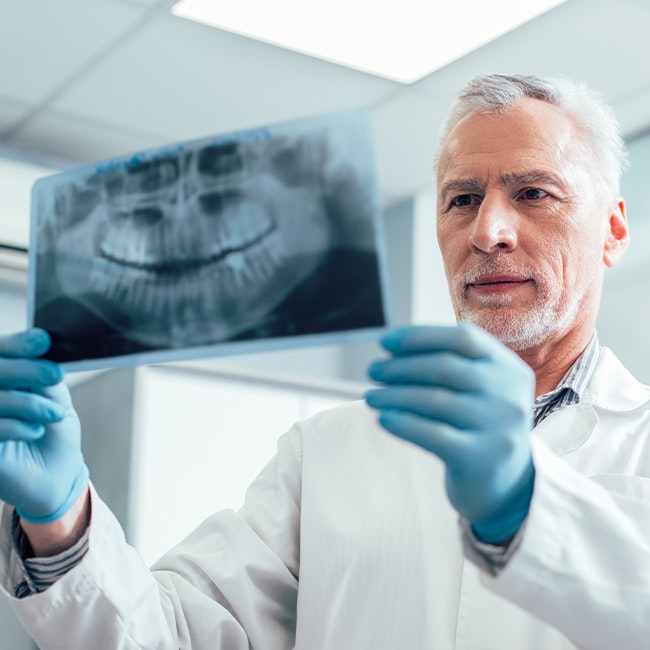
TMJ
New Patients – Save Time at Your First Appointment By Printing and Filling Out Our Forms
The Temporomandibular Joint: A Small But Crucial Part of Your Jaw
Many Patients Do Not Realize The Effect TMJ Disorders Can Have on Their Teeth
While our teeth can withstand a fair amount of pressure, they're not invulnerable.
Over time, TMJ disorders can damage your back teeth. The action of clenching or grinding your TMJ can cause cracks, chips, or other breakage. It may also cause your back teeth to become worn from all the pressure.
Finally, your teeth may feel loose, which can be uncomfortable and stressful.
Though realizing you may have a TMD can seem overwhelming, you do not have to take another step of this journey without help. Our caring, knowledgable dentists can treat your temporomandibular joint problems with oral appliance therapy.
Want to learn more about how you can protect your teeth — and finally live pain free?

Call Us for a Consultation
To Learn If Your Pain Is TMJ Disorder
Typical hallmarks of TMD include clenching, jaw tightness, and headaches. However, not every patient presents with these symptoms. If you think you may have TMD, our dentists can examine your mouth and determine the cause of your discomfort. They will then develop a treatment plan to ease your pain and prevent further oral health concerns like damage to your teeth.
Have a busy schedule? We understand. Our office is open on Saturdays for your convenience. Our dentists work hard to accommodate our patients with Saturday hours.
Our Belmont, NC, dentistry practice is also open for extended hours from 7:00 am – 7:00 pm on Tuesdays through Thursdays, so you can receive dental treatment at a time that works for your schedule.
Get started today. Request a consultation by filling out our online form or by calling our Belmont dental practice.
(704) 825-5111
"This place fixed my dental issues when I relocated to this area in 2016. They will take good care of you. This practice will attend to your dental health and will make sure that you are comfortable. All of the staff members have a smile and they want you to leave on a happy feeling!"
Greg Erick
We Are Proud to Offer Treatment for Your Temporomandibular Disorder
Our dentists offer TMD treatment through oral appliance therapy. Oral appliances are also sometimes known as splints.
Oral appliance therapy is a simple yet effective way to reposition your jaw and alleviate the effects of your temporomandibular joint problems.
This treatment keeps you from grinding and clenching, allowing your inflammation to subside.
Prevention and Protection: See How Oral Appliance Therapy Works

How Often Should I Use My Oral Appliance?
TMJ disorders can be persistent.
While some go away after an injury heals or a stressful situation resolves, others may stick around.
However, if you are consistent with wearing your oral appliance, then you will likely see your symptoms resolve.
Our dentists will give you specific instructions based on your needs. Usually, though, patients will need to wear their mouthguard nightly. If you also wear a retainer, then you can switch between the two, wearing a mouthguard one night and a retainer the next.
Though a mouthguard may feel strange at first, most patients get used to it quickly.
It may also help you to remember that you will be asleep most of the time you're wearing it. Not to mention, you'll likely sleep better too.
Let Our Dentists Show You a World Without TMJ Problems
Headaches, jaw aches, and even earaches — life with TMD can mean daily pain.
Some patients even experience difficulty opening and closing their mouths due to inflamed TMJ joints, making it hard for them to eat or talk.
For a few, TMJ issues may go away after an injury heals or their stress decreases. For others, though, TMD symptoms may persist. TMJ treatment can provide lasting relief.
From finding a diagnosis to treating TMD with oral appliance therapy, our Belmont, NC, dentists may be able to help you.
Excited to begin a new stage? Contact our Gastonia-area office or call
(704) 825-5111

"Super friendly and communicative!" Reviews From Our Charlotte-Area Patients
I had a wonderful and informative experience. Amber and Dr. Starr were great. I'm a stickler on professionalism and presentation and they had both plus some. Highly recommended.
View on GoogleEveryone there is super friendly and communicative! You always know what's going on and what the plan is. I especially love my doctor, Dr. Ashley Starr. I feel super cared for and in control when I do procedures and check-ups with her and the dental assistants.
View on GoogleOther Ways to Ease the Painful Symptoms Of Temporomandibular Disorders
Eating Soft Foods
Your temporomandibular joint may be inflamed after repeated grinding. Give it time to heal by eating soft, healthy food like smoothies, scrambled eggs, and yogurt.
Active Jaw Repositioning
Ever notice you're clenching your jaw? Some of us do this without realizing. Being mindful of your grinding can allow you to actively stop and give your TMJ some slack. This takes time and practice, but it may help you.
Approved Jaw Exercises
Some patients find relief from TMJ with jaw exercises. You may be able to ask your dentist about approved exercises for your case, which can reduce pain and inflammation in your TMJ.
Will I Need Surgery To Treat Temporomandibular Disorder?
Our experienced Belmont, NC, dentists may be able to treat your TMD with oral appliance therapy alone. A mouthguard can relieve the pressure on your jaw joint, leading to reduced or eliminated symptoms.
While you may feel nervous, let us reassure you: many patients can be treated using just a mouthguard.
Typically, temporomandibular joint surgery is only used as a last resort. We would consider it only after you have exhausted all the options, such as an oral appliance (also known as a splint).
If you do not see progress from oral appliance therapy, you may need to visit a trusted specialist. Our Charlotte-area dentists can refer you out if needed.
"I couldn't recommend a place higher." Why Our Belmont, NC, Patients Trust Us
This place is the absolute best. I first want to say just how absolutely amazing all of the front desk workers of this place are. They're literally the nicest people I've ever encountered in my life. On the phone and in-person, it doesn't matter. They're so kind and helpful and just the best. I literally cried after the first time I called because they were just so genuine and kind....I couldn't recommend a place higher. If you're looking for a dentist, this is the place to go.
View on GoogleTop notch! Been going to this office for many years. Referred my friends and family as well! Dr. McCord and his staff are very friendly and personable! They take the time to get to know you and care about you as a person. Not only do they go the extra mile to take care of your dental needs, but your overall well-being! They go above and beyond! Love it here!!!
View on GoogleFrequently Asked Questions About TMJ Disorder
Is a splint the only noninvasive treatment?
No. A splint is a fantastic treatment option for most people, but your dentist may also recommend stress management techniques, or prescribe anti-inflammatories or medications to use in combination with your oral appliance. If misaligned teeth are the cause of your TMD, orthodontic treatments like braces may be recommended. Once your treatment is completed, a splint may be suggested to keep your jaw in proper alignment.
I grind my teeth. Does that mean I have TMD?
Bruxism and TMD are different. Bruxism is when you clench or grind your teeth. While it can be a symptom of TMD, it can also simply be because you are stressed. Not every patient that has bruxism has TMD. However, it is best to have one of our Belmont dentists examine your teeth and mouth to be sure. If you have bruxism but not TMD, they may still suggest oral appliance therapy to prevent wear on your teeth.
I have headaches that have been blamed on something else. Can they be a sign of TMD?
Yes. Headaches and even neck and shoulder pain are often blamed on a variety of other health conditions. They can also be a symptom of TMD. If you suffer from reoccurring headaches, our Belmont dentists can help determine if TMD may be causing or exacerbating your pain.
Is TMJ disorder genetic?
More research is needed to confirm a link between family history and TMJ disorder. However, some studies have suggested that patients who have a family member with TMD may be at an increased risk of developing it themselves.

















